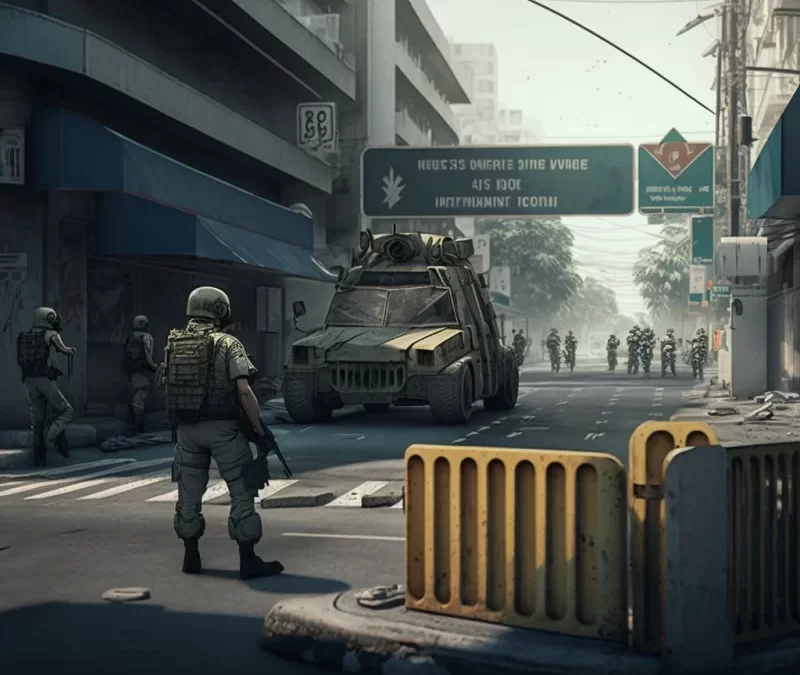How to Survive Martial Law
In recent years, the possibility of martial law being declared in various parts of the world has become a concern for many. Martial law is the temporary imposition of military control over civilian functions, usually during times of crisis, such as civil unrest or natural disasters. Surviving under martial law requires a unique set of skills and knowledge to navigate the challenging conditions and stay safe.
This article will provide valuable insights and practical tips on how to prepare for and cope with the challenges that come along with living under martial law. By being aware of the rules, stocking up on essential supplies, and developing necessary survival skills, you can increase your chances of thriving in this uncertain environment.
Understanding Martial Law
Martial law is an extreme measure taken by a government during times of crisis or emergency. In this section, we will explore the definition and purpose of martial law, the causes and triggers for its implementation, and the legal implications and rights of citizens during martial law.
Definition and Purpose
Martial law is the temporary imposition of military rule over a civilian population in response to extraordinary circumstances. This allows the government to maintain order, ensure the safety of its citizens, and restore normalcy in times of crisis. It is typically enacted when the existing civil authorities are unable to maintain public order or effectively respond to a significant threat.
Causes and Triggers
There are several possible causes and triggers for the implementation of martial law, including:
- Major natural disasters (e.g., earthquakes, hurricanes, tsunamis)
- Widespread civil unrest or riots
- Acts of terrorism or mass violence
- Invasions or armed insurrections
- Other events that compromise the stability of a government or threaten public safety
It’s important to note that the decision to impose martial law ultimately depends on the severity of the situation and the judgment of the government in power.
Legal Implications and Rights
During martial law, the military takes control of the government, and many of the typical rights and freedoms of citizens may be temporarily suspended or restricted. Some potential legal implications and rights changes may include:
- Suspension of habeas corpus, which may lead to detention without trial
- Curfews and restricted movement
- Control of communication and media channels
- Mandatory identification checks and registration
- Increased surveillance and searches
It’s crucial for citizens to stay informed of their rights during martial law and to adapt their behavior accordingly to ensure their safety and compliance with the law.
Section 3: Preparation for Martial Law
Emergency Supplies
Preparing for martial law involves ensuring you have adequate emergency supplies. This includes non-perishable food, water, medical supplies, and sanitation items. Additionally, consider stocking up on essential tools, such as flashlights, batteries, and survival gear [source].
Consider creating a bug-out bag with essential items you can quickly grab in case of evacuation. Your bag should include food, water, clothing, and vital documentation [source].
Communication Methods
Staying informed during martial law is crucial. Develop a communication plan with your loved ones using multiple methods, such as mobile phones, email, and social media. In case of digital communication disruptions, consider alternative options such as two-way radios or satellite phones [source].
Additionally, keep yourself updated on the latest news by tuning into various media outlets like TV, radio, or reliable online sources. This will help you stay informed about changes in rules, restrictions, and safety measures.
Creating a Safety Plan
Developing a safety plan is essential for securing your family’s well-being during martial law. Identify potential safe locations to evacuate to, such as nearby shelters or the homes of trusted friends or relatives[source].
Establish a plan for reuniting with loved ones if you’re separated during a crisis. Choose specific meeting points and regularly update your family members on your whereabouts.
Explore different escape routes and transportation options in case of sudden relocation. Knowing multiple exit points from your home and neighborhood will increase your chances of safely navigating martial law.
Section 4: Survival Strategies During Martial Law
Staying Informed and Alert
It is essential to stay informed and alert during martial law. Monitor news outlets, including social media and local radio stations, for updates on the situation. Be aware of your surroundings, and pay attention to any changes in the behavior of law enforcement and military personnel. Additionally, develop a network of trusted contacts who can share information and provide assistance if needed.
Following Rules and Regulations
During martial law, adhere to the rules and regulations imposed by the authorities. This may include curfews, travel restrictions, and limitations on gathering in public spaces. Abiding by these rules can help you avoid unnecessary confrontations with law enforcement and minimize the risk of detention or arrest. Remember that your main goal is to stay safe and survive the period of martial law.
Avoiding Confrontation
It is crucial to avoid confrontations with law enforcement, military personnel, or other individuals during martial law. Maintain a low profile and be prepared to comply with directives from authorities, even if you disagree with their actions. Avoid participating in protests or demonstrations, as these can quickly escalate into violence and may result in severe consequences.
Protecting Yourself and Others
Ensure the safety of yourself and others by developing a family emergency plan that includes communication strategies, meeting points, and escape routes in case of danger. Stock up on essential supplies, such as food, water, medicine, and emergency gear. Consider creating an improvised weapon for self-defense purposes if the situation becomes dire. Always prioritize the well-being of yourself and your loved ones during martial law.
Post-Martial Law Recovery
Once martial law has been lifted or rescinded, it’s essential for individuals and communities to begin the process of rebuilding and returning to normalcy. This section discusses the steps to take in the aftermath of martial law, focusing on re-establishing normal routines and restoring rights and liberties.
Returning to Normalcy
After the harrowing experience of martial law, it’s natural to desire a return to some semblance of normal life. To do so, consider the following steps:
- Reconnect with family and friends: Reach out to loved ones and rebuild relationships that may have been strained or disconnected during martial law.
- Assess personal and property damage: Determine the extent of any damage to your home, belongings, or community and make necessary repairs.
- Resume daily routines: Gradually reestablish your regular routines, such as work or school, to regain a sense of stability.
- Seek professional help if needed: The stress and trauma of living under martial law can have a lasting impact on mental health. Don’t hesitate to seek therapy or counseling if you’re struggling to cope.
Restoring Rights and Liberties
One of the key challenges following martial law is the restoration of civil rights and liberties that may have been suspended or curtailed. To address this important issue, consider these steps:
- Stay informed: Keep up-to-date with local and national news and developments to understand how your rights and freedoms are being restored.
- Participate in community efforts: Engage in local political or advocacy groups that focus on restoring liberties and promoting transparency.
- Document and report abuses: If you experienced or witnessed human rights violations during martial law, document and report them to authorities, non-governmental organizations, or international bodies to raise awareness and ensure accountability.
- Exercise your rights: Once your rights and liberties are restored, be sure to make use of them, such as voting in elections or engaging in peaceful protests, to promote lasting change and prevent the reoccurrence of martial law.








